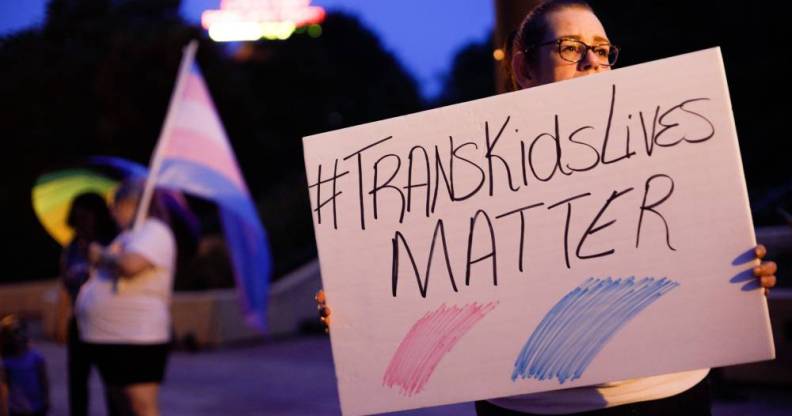Puberty blockers case Bell v Tavistock had ‘major impact’ on trans kids’ mental health, study finds

Despite the court case being overturned years of legal uncertainty severely impacted trans children and their families. (SOPA Images/LightRocket via Getty/Stephen Zenner)
The puberty blockers case brought by Keira Bell against the Tavistock and Portman NHS Foundation Trust has had a devastating impact on the mental health of trans children and their families, a survey has shown.
In 2019, the unprecedented case was brought against the Gender Identity Development Service (GIDS) at the NHS Tavistock and Portman trust in London by Bell, who took puberty blockers at 16 and had a double mastectomy at 20 but later detransitioned, and “Mrs A”, who was trying to prevent her then 16-year-old child from taking puberty blockers.
The case centred on whether under-18s were able to give informed consent to be prescribed completely reversible, puberty-suppressing medications.
In December 2020, the LGBTQ+ community was left reeling after the High Court ruled in Bell’s favour, throwing trans children being treated or waiting for treatment at GIDS into chaos.
The NHS immediately paused referrals from GIDs for puberty blockers, putting young trans people in England and Wales in limbo.
Luckily, in September 2021, the Tavistock’s appeal was successful and the High Court overturned the ruling. In May of this year, Bell was blocked from taking her final appeal to the Supreme Court.
Although Bell v Tavistock was ultimately overturned, years of legal turmoil severely impacted trans children and their families, in terms of their mental health, their trust in the legal system, and their ability to access gender-affirming healthcare.
A new report from trans youth charity Mermaids has shown that almost nine in 10 parents of trans kids said that the case had a negative impact on their own mental health, and the mental health of their children.
The survey was developed by Mermaids’ Dr Abby Barras and Dr Anna Carlile of Goldsmiths, University of London, and was launched in collaboration with LGBT Foundation and Gendered Intelligence.
The survey received responses from 234 parents and carers of trans youth, of which 73 per cent had children on the GIDS waiting list at the time.
Though waiting times for appointments with GIDS, currently the only gender service for under-18s in England, were long before Bell v Tavistock, as of May 2022 there were more than 5,000 people on the list. Children currently wait more than 1,000 days before their first appointment.
But parents of trans kids at the time were terrified of the additional barriers being put in place, with one survey respondent saying: “There is no reason that the judicial system needs to interfere with healthcare issues when so many people and processes are already involved.”
“People, even children who are old enough to make their own informed decisions, should have the right to bodily autonomy and freedom of choice,” said another.
Almost three-quarters of parents and carers said they were concerned about Bell’s lasting impact and capacity to severely limit access to puberty blockers, and more than half said it was likely that families would start trying to access treatment from private providers, overseas, or online.
But the most shocking statistics in the report were those surrounding mental health.
Ahead of Bell v Tavistock being overturned, almost nine in 10 parents and caregivers of trans youth said that their mental health had been negatively impacted by the case, and the same proportion said that their children’s mental health had been negatively impacted.
“It feels like I’m having a long, slow-motion panic attack, like I can’t get my breath properly,” said one parent.
“I feel lost and completely abandoned by the NHS, to who we have entrusted our daughter’s care.”
Other parents reported their children’s increased anxiety, loss of hope, and fears that they might harm themselves.
Though the legal battle in the case of Bell v Tavistock is now over, its effects are still being felt.
It was announced this year that GIDS would be closing to make way for decentralised gender-affirming care for young people in centres across the country that will, hopefully, bring down wait times. The report’s release comes as the NHS holds a consultation on its interim specification for the new decentralised service.
The draft specification has raised alarm bells for activists, with some proposals threatening to make life even harder for trans young people, and Mermaids hopes that its report will act as a warning against insufficient and inconsistent care.
Dr Barras said: “Our findings found that closing the pathways available, even temporarily, had a major impact on the wellbeing of respondents and their children… Bell has been overturned, but those responsible for improving gender-affirming healthcare for those under 18 are still not listening hard enough to what young trans people and their families are saying.
“Mermaids hopes this research goes some way to foregrounding those voices, ensuring young trans people have access to the timely and appropriate gender-affirming healthcare they are entitled to, just like everyone else.”

